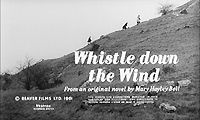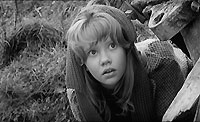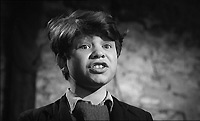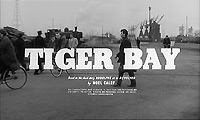|
|
TIGER BAYDirector: J. Lee ThompsonStarring: John Mills, Horst Buchholz, Hayley Mills, Megs Jenkins, Anthony DawsonWHISTLE DOWN THE WIND Director: Bryan Forbes Starring: Hayley Mills, Alan Bates, Bernard Lee, Norman Bird, Elsie Wagstaff Region 2 (UK) DVDs - Reviewed by Ceri Laing
THE FILMS Carlton are releasing another round of classic British films, and this time two of them feature Hayley Mills (daughter of John) in starring roles Ė Tiger Bay and Whistle Down The Wind. Tiger Bay features the story of Gillie (Mills), an orphaned London girl now living with her aunt in the Cardiff port, who witnesses a rejected Polish sailor, Korchinsky (The Magnificent Seven star Buchholz), shoot and kill his girlfriend in the heat of the moment. Korchinsky quickly hides the gun, but later releases that it has been stolen by the young girl. He questions her, and the pair develop a friendship (they are both aliens and alone), and go on the run together. Superintendent Graham (John Mills) is brought in to investigate the crime, and find Gillie. Tiger Bay was produced by the Rank Organisation in 1959. It was directed by J. Lee Thompson (Ice Cold In Alex, North West Frontier, The Guns of Navarone, Cape Fear), from a script by Shelley Smith and John Hawkesworth, based on a short story. Hawkesworth, who also acted as Producer on the film, would go on to write for a range of TV series, as well as creating and producing The Duchess of Duke Street, Danger UXB, By The Sword Divided and ITVís Sherlock Holmes series, starring Jeremy Brett. This was Hayley Millsí first film role, and she shows a remarkable degree of talent for some of her age, with no previous feature film experience. Buchholz and Mills show a real, moving, chemistry in the relationship their two characters develop, and itís also great to see her working with her father. The script is well-devised and thought-out, with some nice little touches. It utilizes the changing multi-cultural face of Britain (as exemplified by the Cardiff port) during the late 1950s as a backdrop to the story. The direction, however, is very heavy-handed, meaning the subtle sequences of the script are lost in over-egged melodrama. This heavy-handedness is reinforced by the unsubtle score from Laurie Johnson (known to many as the composer of the themes for the TV series The Avengers, The New Avengers and The Professionals, as well as composer for feature films, most notably Dr Strangelove or How I Learned to Stop Worrying and Love the Bomb and The First Men in the Moon). Following the success of Tiger Bay, Disney put Hayley Mills under contract, recognising her talent. She made two very successful films in the US, Pollyanna (for which she won an Academy Award) and The Parent Trap, before returning to Britain to make Whistle Down The Wind. Whistle Down The Wind tells the tale of three children, Kathy (Mills), Nan (Diane Holgate) and Charles (Alan Barnes), who live with their widowed father (Bernard Lee) and aunt in a isolated farm outside a Lancashire village. The isolation allows the strong Christian beliefs of the community to have a great influence on the children. When they discover a man (Bates) in their barn, because of his appearance, they believe him to be Jesus Christ. Unbeknownst to them, the man is on the run for a murder heís committed in Derby. Because he is injured the children decide to protect him and keep it a secret that he is there, believing that once people find out about him theyíll only want to crucify him again. But the secret eventually gets out. Whistle Down The Wind was produced by the Allied Film Makers company in 1961. It was directed by Bryan Forbes (The L-Shaped Room, Sťance on a Wet Afternoonł The Wrong Box, and The Stepford Wives) and produced by Richard Attenborough. The script was adapted from a book written by Mary Hayley Bell, by Keith Waterhouse and Willis Hall (who would later write for the satirical BBC series That Was The Week That Was and adapt the Worzel Gummidge books for the ITV series). The script is expertly adapted from the original book, and itís astonishing to think that this is actor Bryan Forbesí directorial debut, as his direction is so deft. The early sequences, with the children at play in the beautiful countryside and thinking theyíve met Christ, and believing they must help and protect him, are charming and delightful. There is also a lot of humour in these sequences, mainly centred around the young Charles. All this is underpinned by gorgeous cinematography (by Oscar-nominated Arthur Ibbetsen), and a beautifully light score by Malcolm Arnold (best known for the St. Trinianís films and Bridge on the River Kwai), which, as well as being playful, adds an ethereal air. These charming sequences slowly give way to seriousness, as the viewer gradually learns more about the man, and the police hunt for him gets ever closer. Arnoldís score is used more sparingly as this seriousness builds, giving the proceedings a more stark sense of reality, in strong counterpoint to the early playful scenes. Whistle Down The Wind is a superbly confident debut from Forbes. The three children are a delight to watch, especially the antics Charles gets up to (Barnes was a real find). Hayley Millsí performance is more polished, which is to be expected, as she was older and more experienced. Bernard Lee gives stout performance as their father. Alan Bates is superb in his first starring role, as his relationship with the children grows, but especially so when he knows his time is up, and heís been deeply affected by the love of the children. Both films feature a wide variety of memorable British actors. In Tiger Bay thereís Kenneth Griffith, George Selway, Marne Maitland, Yvonne Mitchell, and George Pastell. Doctor Who fans will also be interested in an early appearance by series regular Peter Halliday, as a ship hand in the pre-title sequence. Whistle Down The Wind has Norman Bird (who would go on to star as Mr. Braithwaite in Waterhouse and Hallís Worzel Gummidge, alongside Tiger Bay's Megs Jenkins, who played Mrs Braithwaite), Elsie Wagstaff, John Arnatt, Hamilton Dyce, Ronald Hines, Gerald Sim and a young Roy Holder.
THE DISCS Tiger Bay and Whistle Down The Wind are available as two separate releases or as a box set of both. Carlton presents both black and white films in 16:9-enhanced 1.66:1 ratio. The films open with a brand new Carlton International card, followed by The Rank Organisation gong ident on Tiger Bay, and the Allied Film Makers logo' on Whistle Down The Wind. Both prints are good, with only the occasional (very minimal) sparkle, dirt, drop out and the odd fine scratch. These minor faults are more noticeable on the slightly-older Tiger Bay. The contrast on both films is excellent, showcasing Whistle Down The Windís beautiful cinematography to great effect. However, both transfers do exhibit a fair amount of smeariness on quick movement, and Whistle Down The Wind has an irritating instance of moirť patterning on the front of a tractor grill. Tiger Bay runs to 102 minutes and has average bit rate of 5.4Mb/s. Whistle Down The Wind runs to 94 minutes and has an average bit rate of 5.72Mb/s. The sound is presented in the original mono, presented in 2.0 format at 224kbps, and is fine with all dialogue and music clear and distinct. The discs feature animated main menu screens, backed with the respective theme music of each film looped. These offer options to Play the film, Select a Scene, access the Extras on the Tiger Bay disc, play the Trailer on the Whistle Down The Wind disc, and change the Set-up (which is just switching the audio commentary and subtitles on or off) . The sub-menus feature a still image background with the options overlaid. The Select a Scene menus on each disc both feature moving sequences from which to select, with the menu on the Tiger Bay disc backed with incidental music from the film, and bird song and crows cawing on the Whistle Down The Wind disc menu. The menus on the Whistle Down The Wind disc are very effective, utilising images of some the filmís great cinematography, with the main menu also featuring a montage of the characters from the film. The menus on Tiger Bay are far less effective, featuring inappropriate use of colour. The main menu has a horrible mocked-up image into which a montage of sequences from the film is run - on the whole very unsubtle. As such, the menus are a good reflection of the films themselves. Both discs feature English HoH subtitles on the main features, but unfortunately the supplementary materials are not subtitled.
BONUS FEATURES The films both feature an audio commentary with Hayley Mills, guided by film historian Robert Ross (who isnít credited on the discs). These were recorded recently, as the Whistle Down The Wind commentary makes reference to Alan Batesí death late last year, as well as seemingly following on from the Tiger Bay one. Both are very informative. The Tiger Bay one discusses such things as the reasons behind Millsí accidental casting (which lead to the rest of her film and TV career); her initial experiences of acting and film making; and of working with her father. The Whistle Down The Wind commentary provides a great deal of background to the original story the script was adapted from. It was written by Mary Hayley Bell, Hayley Millsí mother, and the children in the story were based on the three Mills children. She also discusses working with Bryan Forbes, as well as with the two other children. Both commentaries contain interesting nuggets of information, for example, youngster Alan Barnes was found in a school near where the film was shot, in Lancashire, and worked only sporadically since Whistle Down The Wind, but recently appeared in the Richard Curtis comedy Love Actually. The trailers for both films are included on their respective discs, presented in 16:9-enhanced 1.78:1 ratio, although they do appear cropped compared to the film images, so may be sourced from 4:3 materials and zoomed for presentation purposes on the discs. They both near enough tell the whole story of each film, just stopping sort of the final resolution! The Tiger Bay trailer runs to three minutes and the Whistle Down The Wind one is slightly shorter. Both are very battered and worn, with lots of scratches, dirt, sparkle and dropout. The sound is slightly trebly. The Tiger Bay disc also features an archive Location Report, centred on German star Buchholz. It features staged sequences of him enjoying the sights and sounds of the Tiger Bay area, interwoven with behind-the-scenes footage of location filming. It has a great newsreel-style original commentary tying it all together. This three-minute piece is presented in black and white 4:3 format, and is from a good quality print with minor scratches, dirt and sparkle. The Whistle Down The Wind disc doesnít feature anything else.
SUMMARY Both these films are variations on similar themes. Where Thompsonís direction in Tiger Bay turns an interesting script into a basic simplistic affair, Forbesí Whistle Down The Down takes an excellent script and turns it into a wonderfully effective and moving film. Whistle Down The Wind comes together under Forbesí direction to make a truly classic film of British cinema. The transfers are generally very good, marred only by the smearing problems, and the occasional print flaw. The bonus materials on the two discs are quite satisfactory, particularly on Tiger Bay, which is a relatively unimportant film, now supported by an excellent set of features. However, I do feel on the whole the Whistle Down The Wind disc is a bit of a let down, as it should have more bonus material to support it. Obviously further archive material, such as the Location Report that appears on the Tiger Bay disc, and similar items on other British film releases by Carlton, would have been included if it existed, but when you compare it to the attention lavished taken on Carltonís forthcoming two-disc release of The Eagle Has Landed, Whistle Down The Wind is obviously lacking. Where are the interviews with Diane Holgate, Alan Barnes, Bryan Forbes or Keith Waterhouse and Willis Hall? Surely a rudimentary Making ofÖ featurette could have been put together using their and Hayley Millsí recollections? Bryan Forbes has contributed commentary tracks to other, less significant, DVD releases (The Slipper and the Rose and Eyewitness), so itís a shame he couldnít have recorded a track for this, his best film. There has been renewed interest in the film following the very successful Andrew Lloyd Webber musical adaptation of the original book, which was first staged in 1996. After a successful run in the West End, the musical version is currently touring the UK, so interest in the film is probably stronger than ever. A release of such a great British film as Whistle Down The Wind really deserves more that it gets with this release, especially as Carlton would have been able to exploit any bonus materials they created to support the film for years to come. However, the bonus features that are included in this release are a lot more than some other companies would include, so Carlton should be commended for making an effort, by including these, and the ones on the Tiger Bay release. |















